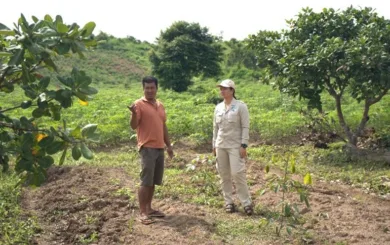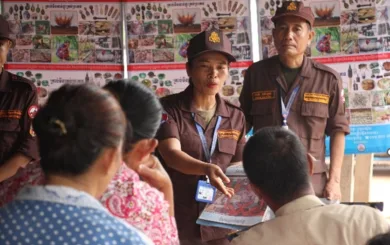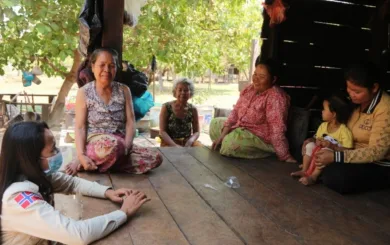Cambodia’s iconic status as one of the world’s most heavily mine-contaminated countries, as well as that being a key impetus for the development of the Anti-Personnel Mine Ban Convention (APMBC), is well known. Regional and internal conflicts spanning almost 30 years also left a deadly legacy of landmines that contaminate the country’s north and western provinces, particularly along the Thai border.
What is less well known is that, in addition to this mine contamination, it is also identified in the top four list of countries with contamination from Cluster Munition Remnant (CMR). Whilst neighboring countries Laos and Vietnam are deemed to have the highest CMR contamination globally, Cambodia still has significant levels, largely confined to the eastern provinces bordering Laos and Vietnam, that were dropped during the Vietnam War, with some 80,000 cluster munitions – totaling around 26 million sub-munitions.
Beyond mines and CMR, Cambodia also has contamination from other explosive ordnance (EO) as well as chemical weapons, stemming from numerous regional and internal conflicts from the 1960s to the late 1990s. Among the rice fields and forests, nearby roads and homes, the tranquil Cambodian countryside is haunted by a hidden hazard that waits, patiently, for its next victim. Millions of landmines, cluster munitions, and other unexploded bombs litter the fields, posing a threat to anyone unfortunate enough to cross their paths.
Extensive contamination of these dangerous and indiscriminate weapons continues to threaten the livelihoods, socio-economic development, and quality of life of those living in affected areas. Cambodia’s rural poor are the hardest hit by landmine and cluster munition contamination. Poverty and reliance on subsistence agriculture often demand that people use land for farming despite the risk.
NPA Mine Action and Disarmament Programme in Cambodia
The Norwegian People’s Aid has a long history in Cambodia, having worked in the country since 1992, initially in support of efforts to repatriate Cambodian refugees returning from Thailand. NPA’s vision is a Cambodia where landmines, cluster munitions and other explosive remnants of war no longer pose a risk to people, and are no longer an obstacle to development.
NPA has implemented its operations in the cluster munition-affected province of Ratanakiri in the eastern part of the country since 2013. The Ratanakiri operations were established to bring NPA’s own expertise with Cluster Munition Remnant Survey (CMRS), including lessons learnt from implementation in Vietnam and Laos, to Cambodia. A second key strategic element of the Ratanakiri operations was to encourage greater female engagement in mine action in the country, with NPA seeking to recruit female teams and train them in all the technical skill sets required, including English language and driving.
NPA’s CMRS project in Ratanakiri was also a precursor to its initiative with Cambodia Mine Action Centre (CMAC). In 2014, following the establishment of NPA’s own operations in Ratanakiri, the program expanded its long-standing partnership with CMAC to support the operation at CMAC’s Demining Unit 5 to conduct survey and clearance of cluster munitions covering the eastern province in Cambodia.
In addition to producing the innovative CMRS that contributes much-needed clarity on the scope of cluster munition contamination in Cambodia, NPA’s engagement with strategic and operational/technical processes gives our work value far beyond the sheer size and reach of our operations in the country working with both national mine action entities – CMAC and Cambodian Mine Action and Victim Assistance Authority (CMAA).
NPA commenced its work to support Cambodia’s Anti-Personal Mine Ban Convention obligations and remain relevant and deliver high value-added projects in mine action in Cambodia. Kep province was declared the first mine-free province in Cambodia in 2022, with an NPA-led project engaging CMAA and CMAC. The survey and clearance work on the Thai-Cambodian border aims to build up larger survey and clearance operations on the border in joint efforts with Thailand, which also contributed to regional peace and security. These initiatives are instrumental in providing a change to national strategic planning and momentum to the overall goal of a mine-free Cambodia by 2025.
Fast facts
- Mine Ban Treaty: State party; clearance deadline is December 31 2025.
- Convention on Cluster Munitions: Not a state party
- Cambodian women are leading the effort to reduce the threat of unexploded bombs in Ratanakiri province – NPA has trained 25 women to locate, map, remove and destroy cluster bombs left over from the Second Indochina War.
- Over 155 million m2 has been released by NPA and NPA in partnership with CMAC since 1992.








